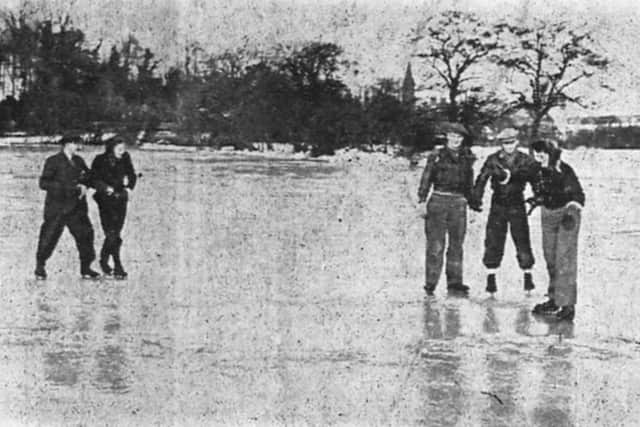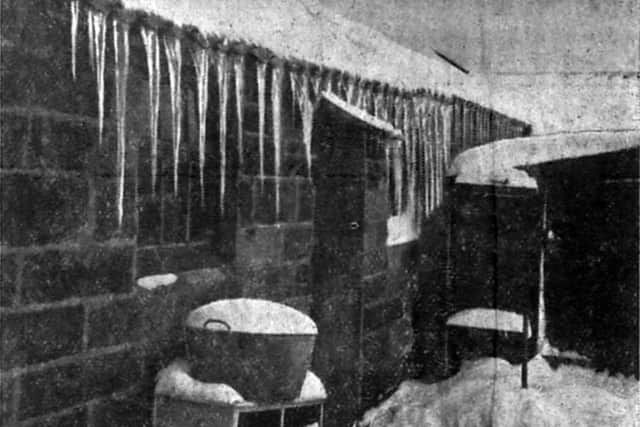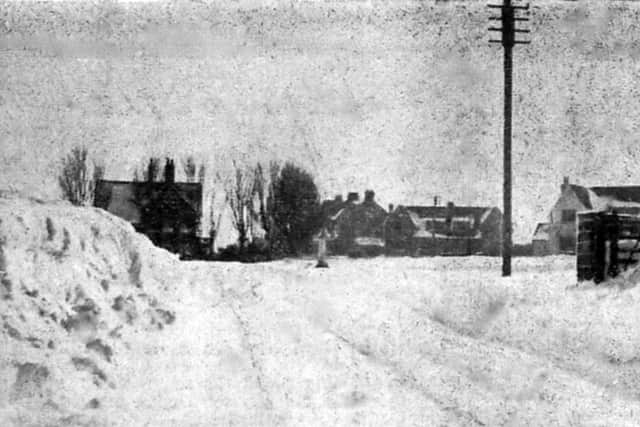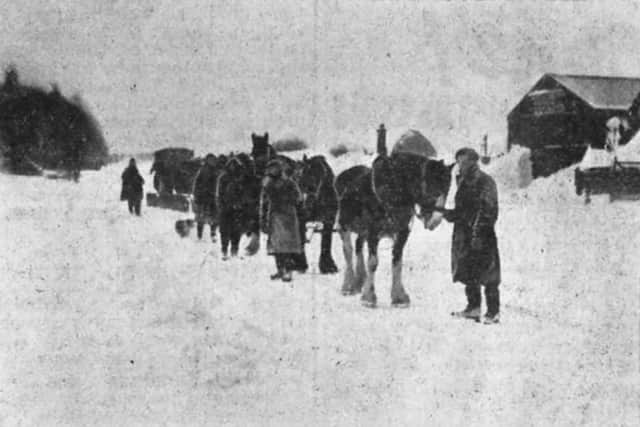Forgotten archives reveal Whitby's winter of 1947 when the seas froze and town was cut off for eight weeks
This month marks the 75th anniversary of the winter of 1947, which saw Whitby and its surrounding villages cut off for up to eight weeks.
Road teams had cut through snow like “blocks of cheese” but blizzards made all efforts futile, and trains were brought to sudden stops under a barrage of ice-falling bullets.
Advertisement
Hide AdAdvertisement
Hide AdArchives reveal the reach of astonishing tales, from thieves in flight to daring rescues and a Dunkirk veteran who survived on the moors by building his own igloo.


Clippings
The newspaper clippings, uncovered by businessman David Tindale as he researched his late father’s life work, are a timely reminder of winter’s grip and the resilience of rural communities.
His father John Tindale had been a photographer with the Whitby Gazette, whose audio reels were turned into films ahead of the centenary of his birth in December.
His son, sharing his findings out of interest and ahead of a wider project with Whitby Museum, said they show astonishing resilience.
Advertisement
Hide AdAdvertisement
Hide AdMr Tindale said: “People still talk about the winter of 1947, told to them by their grandparents now. There were eight weeks of these stories. They started out fairly stoic. Quite quickly, by week two or three, you can see the strain.”
The snows began in late January. Soon, all the major roads were blocked, buses were buried, and farmers had issued ‘a call to the plough’. Ice cream had to be rationed, the Whitby Gazette read.
Soon, reports began to turn. Shortages of sweets turned to potatoes and flour, with food drops by boat to Robin Hood’s Bay. Then funerals attended by sledge, to transport the coffins graveside.


Amid the column inches are mysteries that began to unravel.
Advertisement
Hide AdAdvertisement
Hide AdOne saw a gallant search party set off after a London couple vanished from a Goathland hotel, wearing fur capes and raglan tweed. Soldiers and shepherds were among those that risked their lives in snow flurry searches, only to discover the couple were professional thieves. “They want flogging,” one rescuer said.
Heroes
In the remote village of Roxby, the only escape was through a snow cut tunnel almost to Staithes.


Residents found it an “eerie experience”, the newspaper said, walking within snow walls up to 20ft tall. When it collapsed on the village postman, he was sent to bed with shock, only for his replacement to befall the same “unfortunate mishap”.
Then a cow called Buttercup got stuck, having been watered at the village well. She had to be pushed all the way home.
Advertisement
Hide AdAdvertisement
Hide AdBy March 28, newspaper reports held a resigned tone. After 51 days, as the last road was cleared of six-foot drifts by workmen with German prisoners, a lonely pub landlord shared his story.
“The only thing we really missed was fresh meat,” said Charles Thistle of the Saltersgate Inn.
Stranded
There are so many stories. Of tea flasks that froze, milk churns turning to ice cream, and a Loftus postman who fell through snow to be trapped in a bog. Sinking to his shoulders, he was pulled free with rope. Reports read: “Although exhausted and suffering from severe shock after his unnerving experience, he quickly recovered and continued his round.”


Mr Tindale, of reports of people stranded in the snow above Castleton, said: "It's a bit 'Scott of the Antarctic', but on the North York Moors. There are lots of stories like that.
Advertisement
Hide AdAdvertisement
Hide Ad"It's really hard to freeze saltwater, but the fishing boats were having to be dug out of ice. Everybody just hunkered down. Until the food started to run out, as it did in Robin Hoods Bay.
"What strikes me is what people were prepared to do. Snow on the moors is a fact of life for Whitby people. This was 'once in a century'. It tells us Whitby is an isolated place.
"The difference in Whitby is it's 20,000 people that were stranded all together."
Animals
Amid newspaper clippings were reports of normally timid animals, “very much affected”
Advertisement
Hide AdAdvertisement
Hide AdIn one day alone 14 cormorants were reported in the harbour, while wild duck and Arctic tern took to the River Esk in search of food as boats were surrounded by ice blocks. The Whitby Gazette reported: “Moorland sheep are reported by men employed on road digging to be eating out of the hands of the workers, and all birds are unusally tame.”
Also among the clippings was a short brief on a Mrs Merryweather, of Danby, who had been holidaying in Harrogate and couldn't return to her home.
When she did make it through, it took two days to dig her way into the house, where she was prompty imprisoned by snow for a further two days until friends could reach her.
Igloo
Dunkirk veteran, Joseph Andrews, had been hitchhiking home to Middlesborough with fourpence in his pocket when he became stranded at Rosedale Abbey.
Advertisement
Hide AdAdvertisement
Hide AdTurning instead to Castleton, he spent a night on the moors, building an igloo from ice and snow in efforts to keep warm. When he arrived the following day, his cap was frozen to his head.
He was taken to the police station, where PC Thompson 'thawed him out', gave him food and drink and put him on the Middlesborough train.
A shortlived thaw had also made for anxious moments for shoppers. The Whitby Gazette read: "Pedestrians on the sidewalks were seen to be anxiously looking skyward for warning of the avalanches of snow slipping from the rooftops. "The majority escpaed the falls, but some were less fortunate."
Project
Mr Tindale, having recovered the old clippings, is looking to work on a wider project with Whitby Museum in due course to publish them, so that the stories can be enjoyed in full.
Advertisement
Hide AdAdvertisement
Hide AdPreviously, a vast archive of John Tindale's audio reels, capturing interviews on life on the sea and in remote Whitby communities, was turned into films and exhibitions for Whitby Museum.
Support The Yorkshire Post and become a subscriber today. Your subscription will help us to continue to bring quality news to the people of Yorkshire. In return, you'll see fewer ads on site, get free access to our app and receive exclusive members-only offers. Click here to subscribe.
